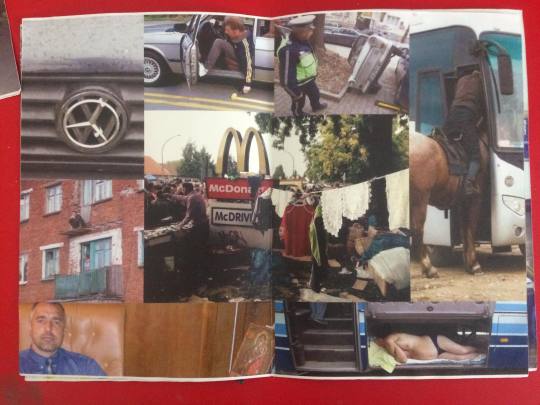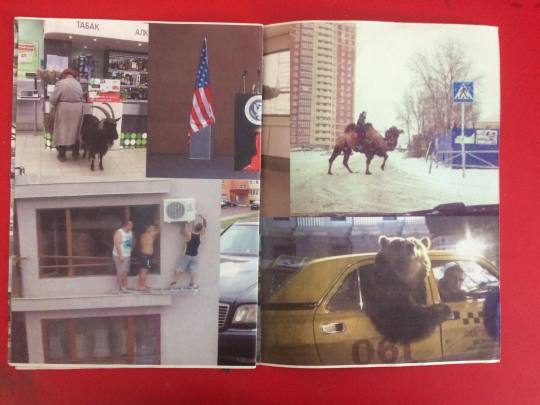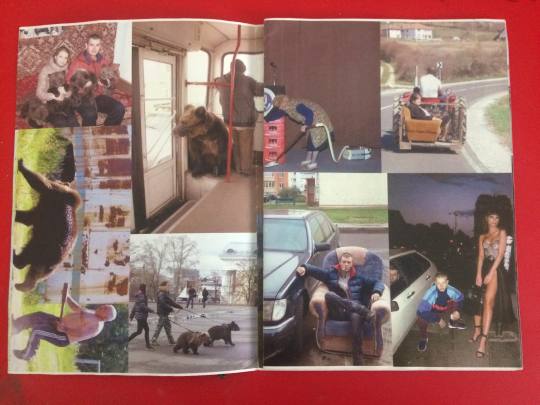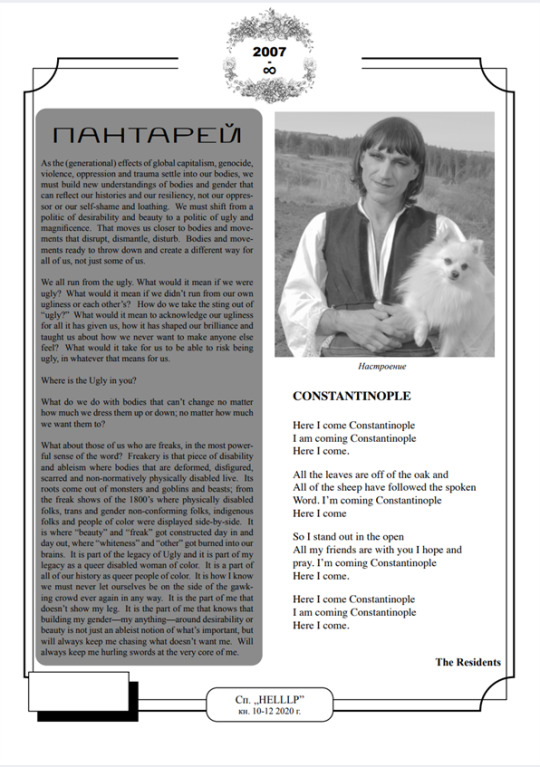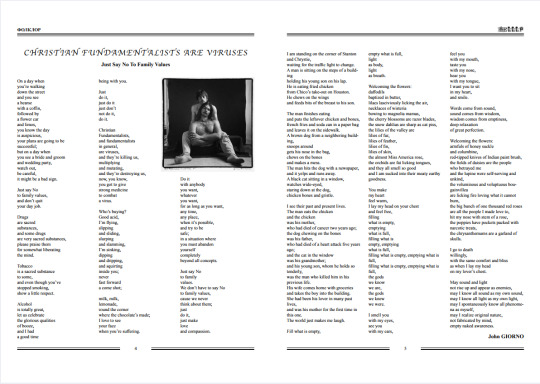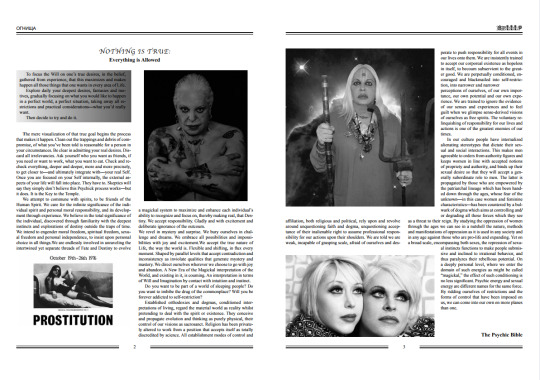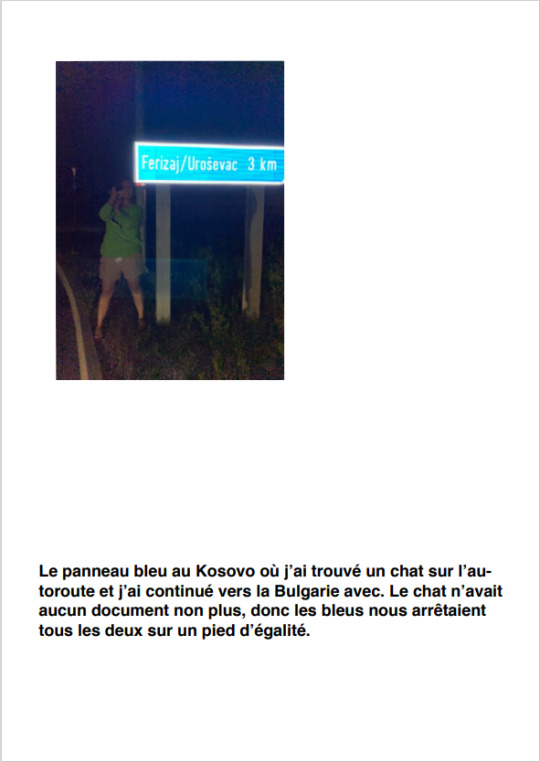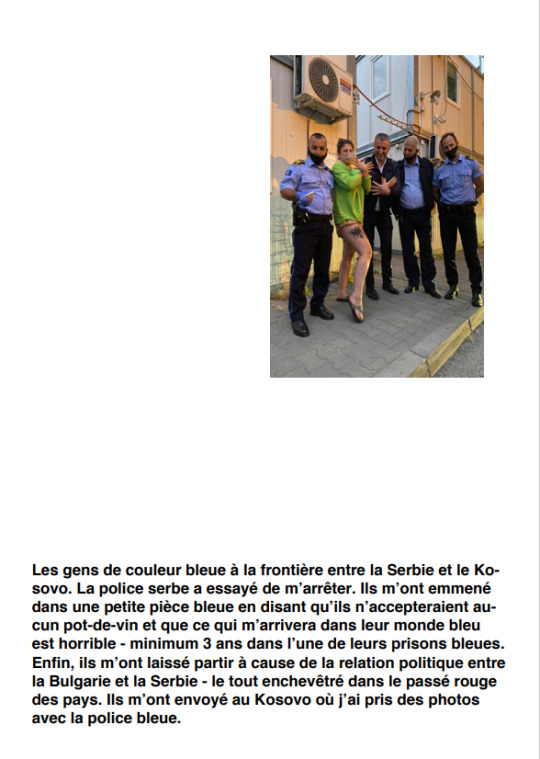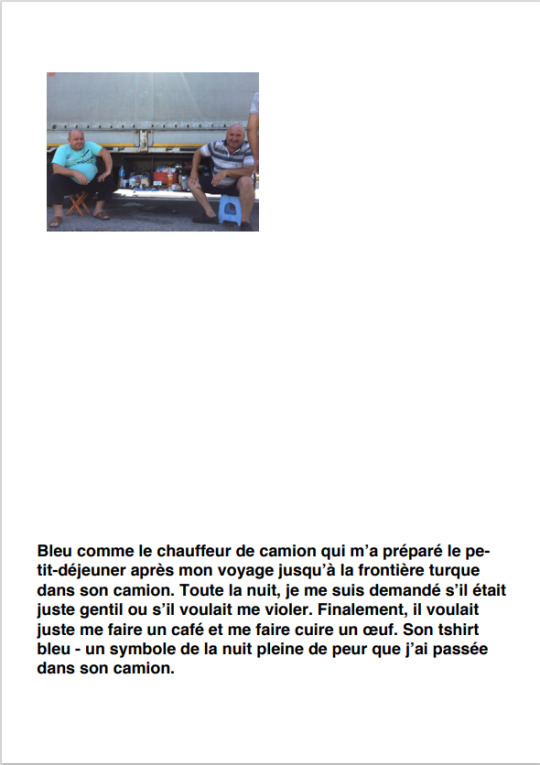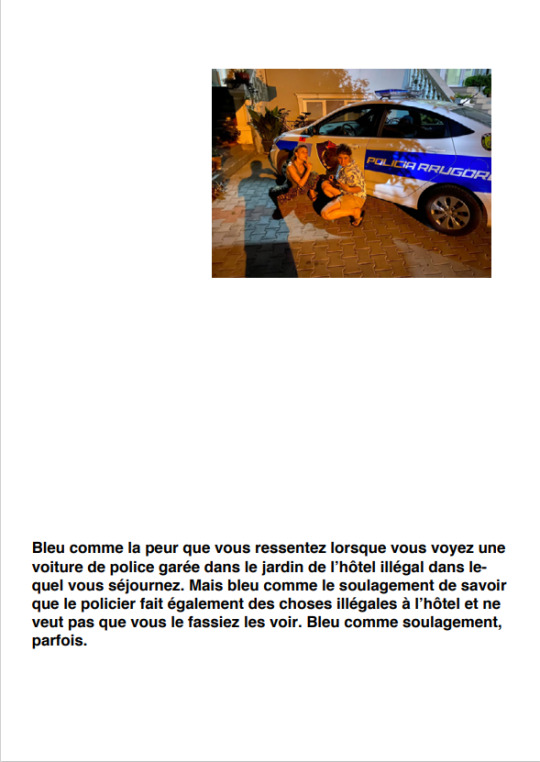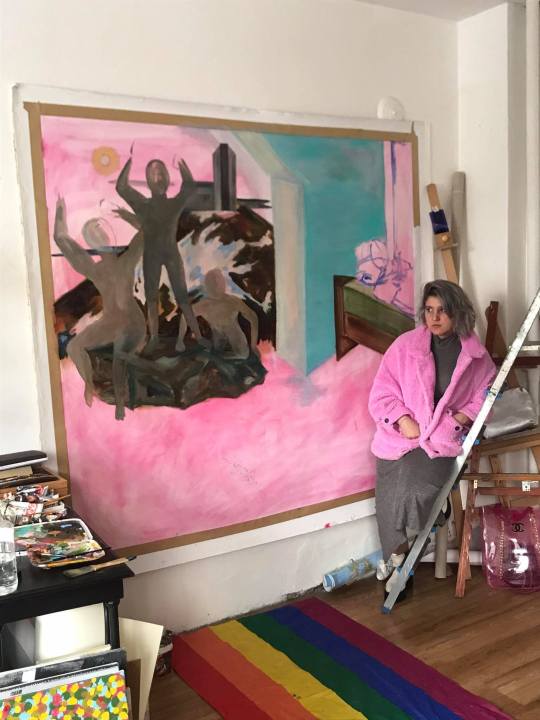Photo
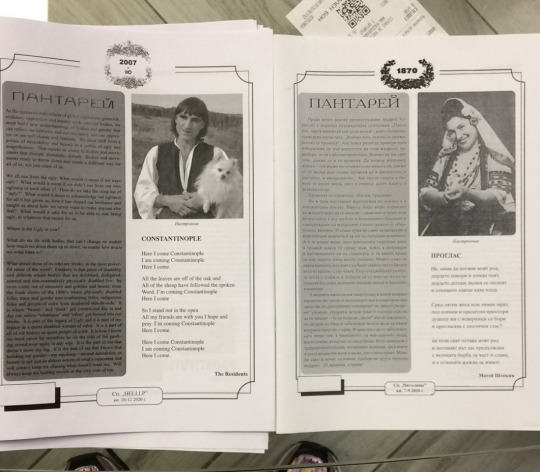

Magazine Hell-p & Magazine Chitalishte next to each other made for an exhibition at Aether art space
in collaboration with Elena Chergilanova and Isabel Sokol- Oxman
0 notes
Photo

spread sample from The Former East text
design in collaboration with Elena Chergilanova
0 notes
Text
The former East
As Igor Zabel writes in his book Contemporary Art Theory " the eastern artist has , in his effort to produce modern art, remained a kind of incompletely realized western artist, and thus a second class artist" or sometimes a slightly different situation where the eastern artist is seen as a "representative of a different and exotic culture". The Eastern artist, in their attempt to please the idealized West, has become either an incompletely developed Westerner or has turned their "easterness" in an exotic fiasco. In the post-Cold War period, the Eastern artist is no longer expected to be a universal artist, the eastern artist is expected to be a Polish, a Bulgarian, a Russian but never "just" an artist.
The Bulgarian contemporary artist rarely admits to have been influenced by bulgarian art and even disregards the bulgarian art. This attitude is self colonial because they are denying the importance of the cultural context that they have grown up in and are striving for these universal forms of art which in their essence are Western ideas of art. Everything on the periphery of the Western idea is seen as “the Other” and the Bulgarian artist does not want to be that Other.
In this text I am going to explore parts of that vernacular pop culture which the Bulgarian intellectual elite are trying to escape from, to be unassociated with and are trying to eliminate its presence in their identity.
DRIFTING EAST CHALGA
Chalga is the Bulgarian version of the Balkan folk music known as Turbo-folk in Serbia, Laiko in Greece, Manele in Romania or Tallava in Albania. Etymologically the word “chalga” means popular entertainment music, once played in Bulgarian towns during the Bulgarian Revival under Ottoman rule by ethnically mixed instrumental bands, the so-called “chalgii”. The popular culture of chalga appeared during the "transition" period which rattled Bulgaria and other post-Soviet countries. While in ex-Yugoslavia this transition period was experienced through wars, Bulgaria's war was an economic one. A survey done by sociologist K. Kolev shows that during the transition period “65% of all people have not bought shoes or clothes in the past two years. 54% have not traveled between settlements. 20% have not bought even soap” . Amidst this national crisis I was born in an intellectuaé Bulgarian family strongly oppossed to chalga culture invested in "protecting high culture". According to Open Society foundation, around the time of my birth the situation in Bulgaria was that “76% of the people have lost their social status, both objectively and subjectively, which leads to social degradation… The people’s vault of values is emptied of meaning as well as is their psychological capacity of correctly responding and dealing with problems and the elite do not need the population, which has fallen into a state of complete exclusion and inertia." . During this turmoil chalga music is gaining traction as the "hero" of the time, an art medium which makes the Bulgarians forget the massive political issues going on. Shops are empty, protests for democracy are ongoing, organized crime is steadily entering politics and people are brutalized. There is an ongoing danger in Bulgaria, especially in the 90s, in these wretched conditions and the brutalization of people, and the relationship between “life” and “art” gives only chalga as a result. Chalga is rejected by the intellectual communities, and "high" and "counterculture", but if reflection of reality in itself is a "high" culture, then isn't chalga a paradoxical high culture in itself?
Throughout this period chalga was more attuned to the cultural, political, and societal woes of everyday Bulgarians than anything produced by the self-proclaimed intellectual tastemakers of the times.
Reoccuring topics in Chalga music :
Mercedes or BMW
The presence of the importance of economical status as represented by such brands as Mercedes and BMW has been an omnipresent feature of the venucalare Bulgarian, and to some extent Balkan, culture since the 90s.After the end of the socialist era people were finally able to buy easily "western" brands. Owning "western" objects belonging to the world of capitalism before '89 was seen as an extreme luxury , objects to which only a priviliged few had access to and the free market shift made the ownership of such objects socially acceptable The western brands are the symbol of privilege and an expression of a high class status. Chalga singers dedicated songs to car brands, and if they didn't explicitly name them after a brand, they implied visually their social status by featuring Mercedes and BMW in their music videos. Thus creating a visual hegemony and an aspiration for economic stability and wealth which is what these ‘luxury’ brands represent for the masses during the transition period. In contemporary pop culture in Bulgaria one can say that the definition of success is owning a Mercedes. Usually owning a Mercedes means that the owner is someone who lives abroad - in Western Europe - and is therefore rich ( the local stereotype is that all Western Europeans are rich). It is very common that most of the people who live up to the Bulgarian dream of owning a Mercedes are working for less than the minimum wage in countries such as the UK, Germany or Switzerland , working over hours and living in horrible conditions. They save money during their stay in Europe in order to buy the shiniest and newest Mercedes or BMW so that when they come back home they can show all their neighbours how powerful and rich they are. In its essence the Mercedes is a symbol not only of a mindset developed during the 90s but can also be seen as a symbol of the social position of the Eastern European diaspora in Western Europe.
In the video clip of Nelina - Bial Mercedes / Нелина - Бял Мерцедес / ENG: White Mercedes we see the narrator, the singer Nelina, dancing in the typical lo fi, green screen 90s aesthetics setting montage and shaky low production camera footage. " A white mercedes is following me around in life and is constantly walking next to me, a white mercedes has taken my attention but love is not sold for money, I have foreign currency that I can sell but I do not sell my love for money , my mom sent me to the change bureau so that I can buy one green dollar but in the change bereau they are out of dollars ... " . The White Mercedes in this song stands for the man whose social status ranks him to have anything he desires. The Mercedes owner waves a one dollar bill at Nelina only to assert his dominance. As viewers we are confronted with different images depicting the comfort of this symbol in its making (as seen in Image 1) and we are put in front of this difficult choice that Nelina is facing. She has to make a choice - submit to the dream of the "west" , of having money , of being Western and putting aside her "easterness" but by doing so affirming even more her position as an Eastern European woman in the context of male - female relationship , or rejecting the idea of having money, as post-socialist philosophy . In this song we can see not only the inner battle of a woman struggling whether to marry a man for money, but we see the more complex relationship of former East and former West ideologies. The "West" represents the bourgeouis, who 50 years prior to this song were murdered or robbed in all post-Soviet countries, through the symbol of Mercedes and rejecting the symbol of Mercedes
represents the traditional socialist thinking which is "higher" and "devoted to the nation". But in Image 2. we see Nelina merging with the Mercedes and this can only mean that no matter what choice she makes it is evident that the symbol of Mercedes is an inevitable part of her identity.
In Rositsa Peycheva - Dai mi Tate Malko Parichki / Росица Пейчева - Дай ми тате малко парички / ENG: Daddy, give me some money 1995, Image 4. , we can see a merge between Balkan culture with the newly arrived Western culture. The five musicians playing traditional to the chalgii music instruments are fading into a highway traversed by a BMW. But in this context the musicians are not the ones seeking dominance through owning luxurious items. The musicians themselves are part of this property. The highest goal for the Balkan gasterbaiter (slang word for bulgarians who work as construction workers in Europe) is to be able to come back to their home country with an expensive car and throw a massive party in their home village. But this parties are not what a party looks like in Western Europe. These parties consist of inviting at least everyone in the village, decorating the village and inviting the most expensive orchestra, usually a Roma orchestra. The musicians play only if the audiences sticks money on their foreheads. If the money stops, the music stops. It is very common for Balkan party- goers to spend between 50euros and 4000 euros per song. Therefore Image 2. is a representation of the highest form of being the most successful, specifically gasterbaiter, Eastern European.
In Image 5: Simpatiagi - Za milioni niama zakoni /Симпатяги - За милиони няма закони / ENG : For people who have millions there are no rules 1998 we see two thugs asserting their power by standing next to their Mercedes. Here the role of the Mercedes is a little bit different. While it still represents dominance, it is a different branch of the Mercedes dream. This dream is designated for the most daring - the ones who are ready to take the once in a lifetime oppurtunity of becoming a criminal. While it is a job that hides some risks, the thugs of the 90s (as we see in the watermark of Image 5) ruled the country and potentially are in charge up to this day. The biggest barrier to becoming a Mercedes owning thug was the risk of getting shot or getting arrested in the case for those who were not so high in the hierarchal structure. The image represents essential trademarks of the Bulgarian thugs - golden chains, dark sunglasses and black clothes. And ofcourse, what is a thug without a Mercedes?
In Image 6: Tzvetelina - Sto mercedesa /Цветелина - Сто мерцедеса / ENG: One hundred Mercedes cars, 1997 we see a young beautiful woman surrounded by a rain of Mercedes. The rain of Mercedes could be seen as a substitute of the cliché rain of money. After all , anyone can have money, but not everyone has enough to buy a Mercedes. Interestingly enough, the lyrics of the song are exploring a love story and the value of the love is represented through the amount of Mercedes cars the lady owns. " 100 Mercedes, I will drive them for 100 years and a 100 men will want to marry me". In this song the Mercedes is no longer just a symbol of money. The Mercedes represents everything - it is the lover, it is the lenght of a life, it is the social position.
WOMEN FOR MALE PLEASURE
In chalga music , the female singer or actress is depicted as a sexy woman whose only concern in life is how to please the men around her. The man is strong and is either a thug or tries to be one. The narrative demonstrates the power play position of the rich Balkan man and the quiet beautiful woman. She is entertaining, forgiving and sensitive. He is strong, powerful and wears gold. He has as many women as possible. The more women he has around him, the richer he appears to be.
In its essence it is a social game whose winner is the richest. This might be regarded as PTSD from the deprivation of capitalism before '89. After '89 the people who were robbed of the experience of "being unequal" could finally show that they are better than their peers. And what other way to prove your superiority but with demonstrating your wealth to acquire high status. In reality, most people in the 90s were poor but that made chalga even more attractive. It represented a sort of a dream world, a so to say collective consciousness. This person, who listens to chalga, is not a chalga celebrity such as Milko Kalaydzhiev or Kamelia , who are projections of his or her dreams. This person articulates through the language of chalga imagery but they remain his or hers best self. Chalga dictates the norms and rules of the pop culture.
The socialist parliaments in Eastern Europe included a higher number of women than those in Western Europe before ‘89. Prior to the regime change, the average percentage of women in those parliaments was 26% compared to only 12.5% in the European Union member states. After the first free elections the level of women’s representation in parliament decreased. In Bulgaria it fell down from 21% to 8.5%.
As the iron curtain fell, mysoginist came front hiding behind the idea of free speech. We can see the root of this issue in “socialist feminism” – the woman was portrayed both as a laborer and a mother thus retaining her “women” duties in her private life, while being equal on paper to her male colleagues. Even though there was a significant number of women in politics, they had almost no power and were shadowing the male leaders in their sphere. And as the transition period of the ‘90s arrived, Western feminist ideologies were seen either as a colonial power trying to impose foreign beliefs or a type of bourgeouis feminism. Thus chalga reacted as a counterculture agent trying to establish a national identity which didn’t respond to external pressure whether that be from the West or the East.
Whether chalga is one of the roots of sexism in Bulgaria or is a reflection of the already existing sexism in the country is not clear. But in contemporary culture chalga listeners preach beliefs of gender inequality. Even though men are as objectified as women in these videos, the objectification remains in the respective gender boxes. The woman must be attractive, have big breasts, wear as little clothing as possible, be submissive even if she is portrayed as strong and independent. She is suffering for she can not live without the male character. The man must be strong, he must display his financial status through cars and gold, he is in power even when he is weak or dependent. He is suffering for the female character but usually forgets about her because he can have any girl he desires. It is a sort of power play between emotional and financial dominance.
IMMIGRATION / EUROPE
The most traumatic topic for Bulgarians today is emmigration. From a population of roughly 9million in 1989 to roughly 7 million in 2019, Bulgaria faces one of the biggest population declines that are not caused by a war. Most Bulgarians aspire to live abroad as they know that this is the only way to self-realisation. The immigration process has become even easier after 2007 (the year Bulgaria became part of the European Union) as visas were no longer required to live in the EU. Chalga music, as the trustworthy mirror it has proven to be, has taken this topic at heart and has a wide range of music clips tackling this issue.
In Kali - Shengen / Кали - Шенген, 2000 , we see a fictive Shengen border which is guarded by two border police men . They are playful but at the same time are strict and do not allow the Bulgarians to enter Shengen. Even though the song was created for parties, it has a strong political message. " Will I manage to get in Shengen? Can I be a European member?" is part of the refrain. Alongside the video , the Shengen song represents one of the biggest political questions at the time. The Eastern European who is wondering whether they are good enough for the Europeans, whether they are savage or civilised, and their worth is measured by their status in the EU. Some of the characters in the video are represented by "european looking" Bulgarians, whilst others dressed in the traditional Bulgarian clothes represent what needs to be eliminated from Bulgarian culture in order to be seen as worthy. The characters trying to pass the border are performing different tricks for the border police and their
entry is based on the entertainment value of their performance. The Eastern European is seen as the one who is invited only if they play by the rules and marginalized if she/he demonstrated their culture too much. The invitation is conditional.
In Lia - Mitnichariu/ Лия - Митничарю / ENG: Borderpolice, 2001 we see a beautiful young lady stuck at a border point. She is begging the policemen to enter their country whilst offering them different types of bribes. She drives an expensive car, which means that she has been working abroad and now wants to go back home. The border police do not allow people with expensive cars to pass the border without taking a bribe, even today. The lyrics of the song " give him 200 deutsche marks, he is human after all and he needs money to buy cigarettes" are giving a sort of innocence to the act of corruption. Lia is normalizing the corruption culture but she is also giving a voice to the Bulgarians who live abroad and experience this border police reality. Rather than describing a fictional situation, Lia is addressing an actual issue . She is not trying to take a political stance i.e. fight corruption, but rather is trying to deal with immediate corrupted regulations .The Bulgarian doesn't want to be involved in changing the country, they know it is not possible. The Bulgarian wants to get rid of the bureaucratic situation as fast as possible and knows the cost of it. The individual wants to give the money required and go home to see their family as fast as possible because they have only a few days off from work in the West. In a few days they will have to drive another 1000 km to go back to Western Europe and continue working. The border police is just one of the many obstacles on the journey. The Bulgarian knows that if he refuses to pay the bribe there will be greater consequences, even if he has not done anything illegal. Mitnichariu is a song which I listen to every time I am faced with Balkan border police, it gives assurance that I am not the only one experiencing this injustice and it gives me hope that these thug policemen are eventually going to let me through the border.
The border is a mythical location. It is a place where anything it can happen. For the border police it is a sort of cash machine. Refering to my own experience during the summer of 2020 I was asked for my car insurance at the border between Montenegro and Croatia. I gave them my international insurance which explicitly covers Montenegro. The borderpolice said it is not possible to pass through unless I buy their insurance and claimed that mine was invalid. After arguing for twenty minutes, one of the border police gave me 3 choice : buy their insurance, get arrested or go back to Croatia. When I bought their insurance at the price of 15 euros and hurried to enter Montenegro, I saw that document they gave me said One Week Insurance for Belarus. An elaborate scheme for taking bribes through a company in another country. Technically, this insurance was worthless, unless I went to Belarus in the upcoming days. This is just one of the many examples of the cash machine which Balkan borders can be. In the video clip of Lia we can see an exploration of this topic through her personal experience, which even though personal can be relatable for any Eastern Europeans who has had to pass through the Balkans by car.
Even though there are other visual culture references in chalga music , I have decided to focus in this text on the holy trinity of the chalga person - cars, women and Europe. heteronormativity
To end this visual analysis of chalga we must have in mind that the music in its essence is Orientalist but it is not the Saidian concept of Orientalism. Bulgaria does not have the colonial history which Europe has with Oriental culture but was rather under Ottoman rule for 500 years up until the late 19th century which makes orientalism a big part of the Balkan identity. The orientalism of chalga helps the listener to break free from the cultural elite formed during Soviet times and it can been seen as a tool to decolonize the national identity from Western culture. Rather than mocking “Eastern” values which are seen as uncivilized or backward in the eyes of Western Europe, the sultans and sheiks are transformed in a treasure vault mocking the Western ideals. They have been transformed in mafia businessmen, luxury capitalist gods, and the target of irony , even if not conscious, are the dreams connected to the Western life.
__________________
Bibliography:
Igor Zabel - Contemporary Art Theory
Rosemary Statelova - The Seven Sins of Chalga
Boris Groys- The Total Art of Stalinism: Avant-Garde, Aesthetic Dictatorship, and Beyond
Boryana Rossa - The Tree of Bulgarian artists
Vesa Kurkela - Balkan Popular Culture and the Ottoman Ecumene: Music, Image, and Regional Political Discourse
Rory Archer - Assessing Turbofolk Controversies: Popular Music between the Nation and the Balkans.
Reference links:
https://www.youtube.com/watch?v=Kv18ZnLFQBc - Bial Mercedes
https://www.youtube.com/watch?v=i5dJVFoXzL4 - 100 Mercedesa
https://www.youtube.com/watch?v=YvjzB3zQDRg - Dai mi tate malko parichki
https://www.youtube.com/watch?v=TVMTaIIFQgQ - Za milioni niama zakoni
https://www.youtube.com/watch?v=QZtN1Fu_G6I - Mitnichariu
https://www.youtube.com/watch?v=RwzVGVjtAIs - Shengen
6 notes
·
View notes

